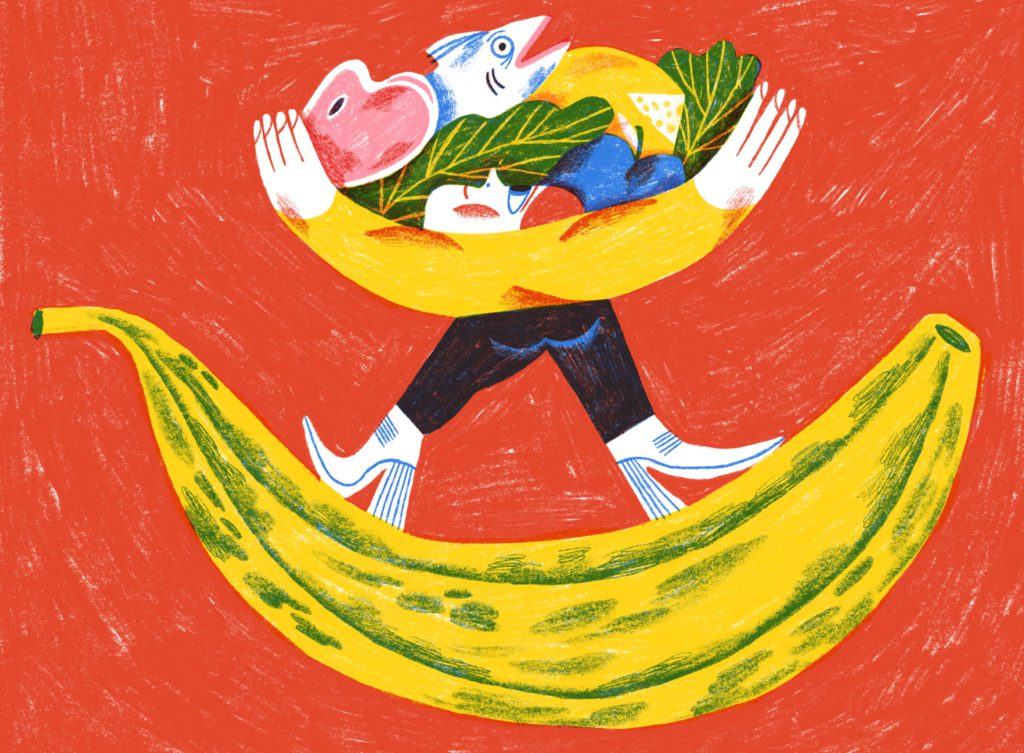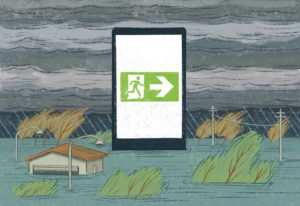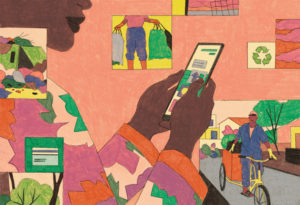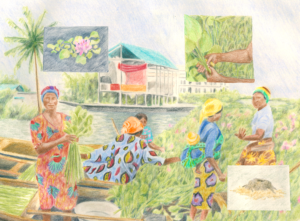
Alice Piaggio
Description
Bii is a social business fighting food waste and food insecurity by valorizing surplus food. They do so through five key activities:
- Food Sharing: Distribution of unsold products to charitable entities taking care of vulnerable children via a collaborative and CO2-free distribution chain.
- Food Market: A marketplace (mobile app) that enables the food sector to sell surplus food at low prices to consumers looking for cheaper deals to combat the high cost of living.
- Food Consultancy: Tailor-made diagnostic service for the food industry across the entire supply chain to avoid loss and waste.
- Food Transformation: Processing surpluses into value-added products, by creating economic opportunities for women in the circular economy.
- Food Awareness: Awareness-raising, training & advocacy on food waste, zero-waste cooking and nutrition in schools, NGOs and the public, up to the est. of anti-food waste laws.
Context
Global Perspective
From 2021 to 2022, global food insecurity and hunger remained largely unchanged but significantly higher than pre-COVID-19 levels. In 2022, 29.6% of the global population (2.4 billion people) experienced moderate or severe food insecurity, with about 900 million (11.3%) facing severe food insecurity. Around 735 million people (9.2% of the global population) faced hunger in 2022, up from 7.9% in 2019. Food insecurity disproportionately affects women, though the gender gap narrowed from 3.8% in 2021 to 2.4% in 2022. Additionally, one in five children under five is underdeveloped due to lack of food.
Simultaneously, approximately one-third of the world’s food production is wasted (17%) or lost (14%) along the supply chain, a phenomenon known as “The Food Waste Paradox.” Just one-quarter of this wasted food could end hunger, while the rest could increase access to healthier diets, as most food is lost at the agricultural level. Food loss and waste (FLW) also account for 8-10% of global greenhouse gas emissions, contributing to climate change, which negatively impacts food systems by decreasing crop yields, reducing nutritional quality, and disrupting supply chains.To address hunger and improve food security, it is crucial to reduce food loss and waste by innovating supply chains and enhancing food redistribution channels.
Focus on Sub-Saharan Africa :
Global food insecurity significantly impacts Africa. Limited resources, inefficient distribution, and lack of coordination exacerbate food insecurity, affecting vulnerable populations. Despite progress in Asia and Latin America, hunger continues to rise across all subregions of Africa. In 2022, an estimated 868 million people in Africa were moderately or severely food insecure, with 342 million severely food insecure. The prevalence of undernourishment in Africa increased from 19.4% in 2021 to 19.7% in 2022, affecting 11 million more people.
The war in Ukraine has further increased food prices globally, including in Africa, without a corresponding rise in incomes, leading to poorer diets and more hunger. Additionally, Africa is experiencing rapid population growth and urbanization, projected to result in 70% of the population living in cities by 2050. This shift presents challenges for agrifood systems in ensuring access to affordable and healthy diets.
The Ivorian context in particular :
While growth in the service and industrial sectors has driven poverty reduction, rising food prices have offset economic growth benefits. Currently, 11.4% of the population lives below the international poverty line, and 39.5% are considered poor by national standards. Approximately 3.1 million people (10.1%) face hunger, with 4.4% undernourished, 23% of children stunted, and 12.8% underweight. Ivory Coast has a young and growing population, with 75.6% under 35 years old and a population growth rate of 2.9% per year. Urbanization is changing consumption patterns, with more people consuming processed foods from supermarkets and restaurants.
Technical details & Operations
Today Bii is implemented in Madagascar and Ivory Coast, having daily positive impact. The Food Transformation activity is only running in Madagascar and the Food Market activity is a new one that will be launched in Ivory Coast as a Pilot market. The remaining activities are implemented in both countries. Those three activities were also in place in Morocco from 2020 to 2023, however it needed to stop due to missing financial and human resources.
Bii’s ambition is to become the pan-African solution to fight food waste & loss efficiently and turn a problem into an opportunity to create green jobs.
Every activity has different operations:
Food Sharing :
The activity is based on a food redistribution chain, using only existing resources. Food is collected, transported, prepared and shared at no extra cost:
a) Collection: Food Donor staff collect surplus food and place it in reusable boxes instead of throwing it away.
b) Transport: Their transport partners collect and deliver the food to the Food Recipient nearby, using their daily transport routes and the free space in their vehicles, without generating additional costs or CO2! In Abidjan, their logistics partner is Glovo. Through their CSR commitment, they deliver donations free of charge. They use their B2B platform and only have to order a delivery driver when needed. All their CO2 emissions are offset for carbon-neutral transport.
c) Consumption: The Food Receiving team prepares the food received using the existing kitchen infrastructure to serve a delicious free meal to the children!
All the while keeping in mind food safety requirements and legally protecting all stakeholders involved in the food supply chain.
a) Food safety and hygiene:
Bii is committed to keep food redistribution operations risk-free by giving due consideration to all aspects related to hygiene and food safety:
Bii carefully assess and select potential Food Donors and Receivers to ensure that they meet all food safety requirements.
Bii accompanies Donors and Receivers in setting up the distribution chain to ensure that everything is done in compliance with food hygiene. Bii supports Food Donors and Receivers by providing communication materials to spread the word about food safety.
b) Legal protection:
Bii has developed a legal framework that protects all stakeholders involved in the food donation supply chain (Food Donor, Food Transporter, Food Receiver and volunteers). Bii’s legal documents have been reviewed nationally and internationally by legal experts and correspond 100% to the local needs and those of our partners. Bii guarantees that no legal risks can arise from food donations.
- Food Market:
Bii is currently building a platform that has several interfaces: a B2C application for consumers, a admin panel access for food businesses, an operation web application for food businesses, an admin panel access for the Bii team.
As for the Food Sharing activity, Bii has developed a complete legal toolkit ensuring also that everything that has not been sold on time (1 day before expiry date) is donated to Bii’s association and redistributed to children thanks to the Food Sharing activity. - Food Consultancy:
Bii has developed a special consultancy framework and methodology for hotels, starting with an initial diagnostic phase via an audit to create baseline data, over proposing different solutions up to implementing an action plan and follow up. - Food Transformation: Bii recovers surplus green beans through a zero-carbon transport from the client. The women sorting the products, processing it into the different value-added products and sending it to the local selling points. Everything is documented through standard operating procedures.
Deployment & Impact
- Food Sharing (since 2020)
100 tons of food has been saved from being wasted enabling the distribution of 400 000 meals to more than 10 000 children in need in Ivory Coast, Madagascar and Morocco. At the same time 190 tons of CO2 emissions have been avoided and - Food Market:
Bii is still in the development phase and plan to launch the surplus marketplace in 2024 in Ivory Coast as the pilot country. - Food Consultancy:
Bii’s clients have been mainly hotels for this activity, such as Ibis (Accor Group), Azalai, Bacelo group etc. Bii supported those hotels in three countries to reduce their food waste in the first place but also to channel surplus food to children through their Food Sharing activity. Furthermore Bii supported them to get for the first time inside views into how much products and what kind of products are left on a buffet. - Food Transformation:
Bii selected and trained 12 women for 7 months on food processing, entrepreneurship and female leadership. Bii refurbished 1 workshop with processing material, solar panels and a hybrid solar-oven to dry fruits and vegetables. Bii did a market study with potential customers and sales points in order to find the perfect product-market fit between a tasty product, that suits customer budget, are nutritious and fit into the supermarket food segment. In collaboration with food laboratories and a renowned chef, Bii developed 5 value-added products out of otherwise lost green beans because they do not have the right shape, form and color to get exported from Madagascar to Europe. - Food Awareness:
Bii organized zero cooking waste workshops, ran awareness campaigns in universities, school and NGOs as well as online and during events and has been published on diverse online media from reportage over podcasts and articles.
The total number of people reached is about 20 000 people.





